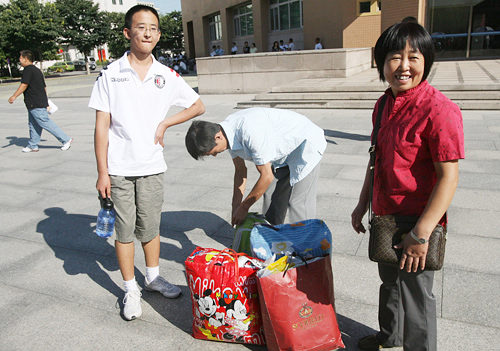|
 |
|
STAR STUDENT: Zhang Xinyang, accompanied by his parents, attended the Beijing University of Technology for master's program back in 2008 (CFP) |
"Liu's interest in math didn't target high grades. His divergent thinking was reflected in his study of other subjects, and even the pressure from the college entrance exam didn't erode his thinking habit," said Tian Jukun, another high-school teacher of Liu.
Independent college recruitment procedures in the United States ensure that gifted students like Liu are admitted to schools which will adequately nurture their gifts, said Yun Zhiwei, the gold medalist of the International Mathematical Olympiad (IMO) in 2000.
After winning the IMO gold medal, Yun transferred to Princeton University and later to the Massachusetts Institute of Technology.
Yun said Chinese math talents lack opportunities to be instructed by world-class professors. "Almost every research university in the United States has top professors working on the frontier of mathematical research. It is much easier for students to find tutors sharing similar research interests," Yun said.
In contrast, students in some math fields cannot find a professor to instruct their further research in China. Yun took his research of geometric representation theory as an example. "Because it's not a field well developed in China, it's hard to find experts, or even researchers," he said.
Most of the top 20 world-class mathematical institutes are in developed countries. "There is a wide gap between China and the United States, though the gap is narrowing," said Cao Yiming, a professor with the School of Mathematical Sciences at Beijing Normal University. "Some U.S. states even introduced laws to ensure researches on, training of and help to these gifted students."
Parents also play a key role in shaping the futures of child-geniuses.
After completing his master's degree at Beijing University of Technology, Zhang started his doctoral studies in fundamental mathematics at the Beijing University of Aeronautics and Astronautics (BUAA) this September. But Zhang said much of his childhood was "like mental torture."
A report by the Guangzhou-based Southern Weekend said the 16-year-old math whiz is not familiar with Chinese classical literature as his parents wanted him to focus entirely on math.
Zhang's parents have insisted that he concentrate only on his studies. Recently, his father found him playing computer games. After the ensuing argument, his father left the BUAA and walked 50 km back to his home in Hebei Province.
"He wanted to punish me but in reality, he was actually punishing himself," Zhang said.
He claimed that his parents wanted him to pursue his studies in Beijing in order to realize a dream that they were unable to fulfill. In return, he threatened that he would find a job back in his hometown unless his parents buy him an apartment in Beijing.
"They planned my life and tried to convince me that what they were forcing me to do was what I actually wanted," he said.
In a recent CCTV interview, Zhang expressed anxiety over his future. He worried he would become the next Wang Sihan or Zhang Manyi, two geniuses who entered universities at the age of 14 but were expelled by the schools due to their poor academic performance.
Like Zhang's parents, many Chinese parents push their children too hard and insist on rigid teaching methods which, in many instances, stifle their children's gifts.
In contrast, Australian mathematician Terence Tao received extensive support from his parents. Tao won an IMO gold metal at the age of 13, completed his Ph.D. at Princeton University at 20, and won the world's top math prize—the Fields Medal—at 31.
Tao's father allowed the young prodigy to develop his talent at his own pace, allowing him to focus on the subjects and areas that interested him most.
Even Liu has benefited from his parents' laissez-faire education. He was sent to some courses of special interests such as IMO courses, but hasn't been severely reprimanded or praised for his school performance. This has allowed him to pursue what he truly likes and develop his independent thinking.
Many Chinese math geniuses aren't really interested in mathematics, said Professor Cao. One survey Cao had last year said most of China's IMO gold medalists haven't taken math related jobs.
"Most of Chinese IMO contestants want to add the 10 or 20 additional scores to their final college entrance exam results, which an IMO medal will guarantee, or target the possibilities they will be admitted to top national universities," said Cao.
But different from answering questions in IMO competitions, cracking conjectures demands true interests and perseverance, because "it will take years before you enter the frontier of mathematical research at around 30s," Yun said.
Yun worked with Ngô Báo Châu, a 39-year-old Vietnamese mathematician and the Fields Medal winner last year. "Châu is persistent, sticks to his pace of research, and never makes haste to have his papers published, while having a nice taste for wine, music and world literature," Yun said.
Creation and innovation are enabled by a concrete and systematic knowledge base, said Xu Kuangdi, an academician of the Chinese Academy of Engineering. Xu encouraged students to read many literary works with powerful imagination because imagination will "enable divergent thinking, reasoning by analogy, and communicating by metaphor, and eventually lead to innovation," Xu said. | 